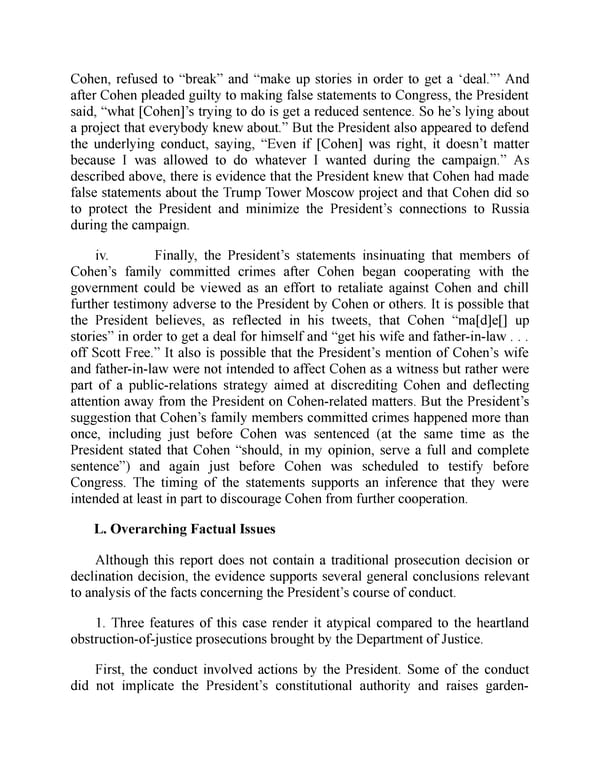Cohen, refused to “break” and “make up stories in order to get a ‘deal.”’ And after Cohen pleaded guilty to making false statements to Congress, the President said, “what [Cohen]’s trying to do is get a reduced sentence. So he’s lying about a project that everybody knew about.” But the President also appeared to defend the underlying conduct, saying, “Even if [Cohen] was right, it doesn’t matter because I was allowed to do whatever I wanted during the campaign.” As described above, there is evidence that the President knew that Cohen had made false statements about the Trump Tower Moscow project and that Cohen did so to protect the President and minimize the President’s connections to Russia during the campaign. iv. Finally, the President’s statements insinuating that members of Cohen’s family committed crimes after Cohen began cooperating with the government could be viewed as an effort to retaliate against Cohen and chill further testimony adverse to the President by Cohen or others. It is possible that the President believes, as reflected in his tweets, that Cohen “ma[d]e[] up stories” in order to get a deal for himself and “get his wife and father-in-law . . . off Scott Free.” It also is possible that the President’s mention of Cohen’s wife and father-in-law were not intended to affect Cohen as a witness but rather were part of a public-relations strategy aimed at discrediting Cohen and deflecting attention away from the President on Cohen-related matters. But the President’s suggestion that Cohen’s family members committed crimes happened more than once, including just before Cohen was sentenced (at the same time as the President stated that Cohen “should, in my opinion, serve a full and complete sentence”) and again just before Cohen was scheduled to testify before Congress. The timing of the statements supports an inference that they were intended at least in part to discourage Cohen from further cooperation. L. Overarching Factual Issues Although this report does not contain a traditional prosecution decision or declination decision, the evidence supports several general conclusions relevant to analysis of the facts concerning the President’s course of conduct. 1. Three features of this case render it atypical compared to the heartland obstruction-of-justice prosecutions brought by the Department of Justice. First, the conduct involved actions by the President. Some of the conduct did not implicate the President’s constitutional authority and raises garden-
 Mueller Report PDF Page 419 Page 421
Mueller Report PDF Page 419 Page 421